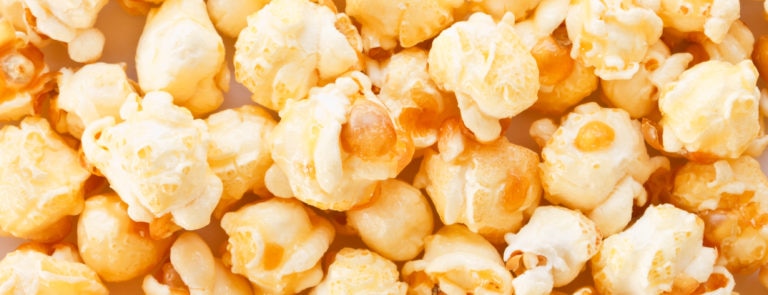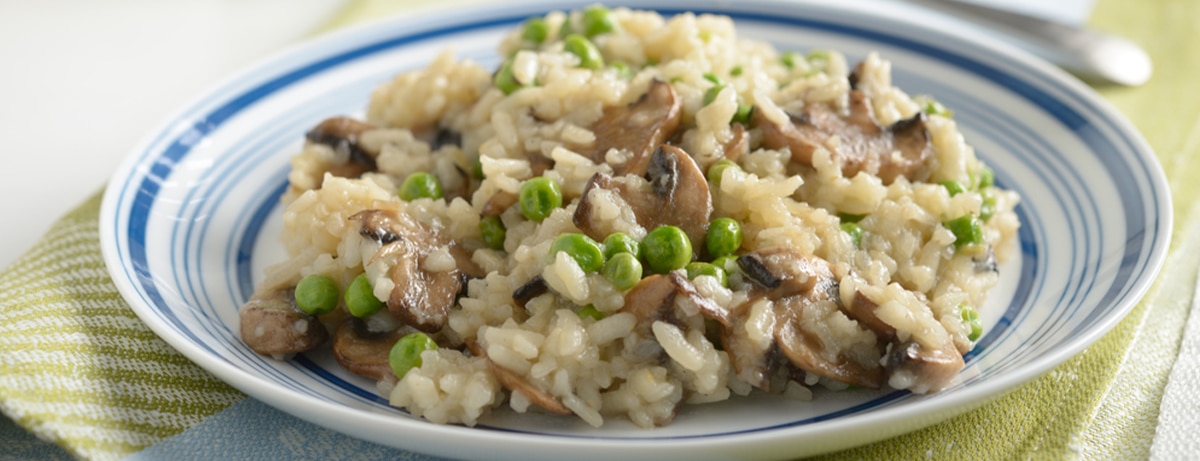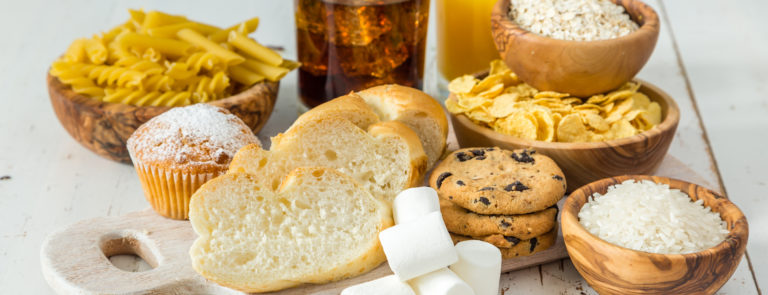15% off £35 OR 20% off £45
Is popcorn a good healthy snack?

Think popcorn is an unhealthy snack that should only be eaten at the cinema? Think again!
Without all the added sugar and salt that’s often mixed into popcorn packets, this grain is actually a healthy treat and a rich source of numerous vital nutrients. Find out all about the health benefits of popcorn below.
In this article, we’ll explore:
- What popcorn is
- If all types of popcorn is healthy
- The calories in popcorn
- Popcorn nutrition
- 8 health benefits of popcorn
- How to make popcorn a healthy snack
- Our favourite popcorn snacks
What is popcorn?
We’ve all tried it, but what actually is popcorn?
Coming from a specific type of corn that expands when heated up, popcorn has a range of health benefits - so it’s worth knowing about where it came from.
The popcorn type of maize plant was domesticated by the Pre-Columbian indigineous people of America in 5000 B.C.1
However we only have evidence of popcorn actually being ‘popped’ in the 1820’s in the east of the US.2
What is air-popped popcorn?
Basically air-popped popcorn is the popcorn we all know and love.
Whether we’re munching on it at the cinema or as a light midday snack.
However, there is a slight difference between pre-packed microwave popcorn and traditional air-popped popcorn that you have to pop yourself, which leads us onto the next question.
Are all types of popcorn healthy?
Not all types of popcorn are considered healthy.
This is down to a couple of different reasons, but mainly the fact that microwave popcorn often has a lot of salt, sugar and flavourings added to it.
In particular, pre-packaged popcorn may have hydrogenated or partially hydrogenated oils added to it, which contain potentially harmful trans fats that are linked to some serious health conditions.3
Summary
- Popcorn is a specific type of corn that expands when heated
- Air-popped popcorn is a healthier alternative to microwave popcorn
Calories in plain, air-popped popcorn
Wondering about air-popped popcorn calories?
Well in one 28g serving of plain, air-popped popcorn, there is approximately 108 calories – which is what makes it such a great snack for people who are trying to reduce their calorie intake.4
Popcorn nutrition
While some people wouldn’t consider popcorn as the healthiest of snacks, it actually comes with a whole range of important nutrients.
This is mainly due to popcorn being a whole-grain food, discover some of the key nutritional values in 28g of popcorn below:5,6
| Energy | 108kcal |
|---|---|
| Fat | 1.2g |
| Protein | 3.4g |
| Carbs | 21.7g |
| Fibre | 4.2g |
| Calcium | 2.8mg |
| Iron | 0.75mg |
| Magnesium | 37.1mg |
| Phosphorus | 85mg |
| Potassium | 85.3mg |
| Sodium | 1.1mg |
| Vitamin B6 (Pyridoxine) | 0.069mg |
| Vitamin B3 (Niacin) | 0.55mg |
| Vitamin B1 (Thiamin) | 0.58mg |
Popcorn fibre
In one 28g serving of plain, air-popped popcorn there is approximately 4.2g of fibre which makes up for 17% of the recommended daily intake (according to a 2,000 calorie diet).7
Can popcorn be fattening?
Like a lot of foods, popcorn can be fattening if a lot of fats, sugar and salt has been added to it.
However, if you’ve bought the corn and popped it yourself, there’s only 1.2g of fat per 28g serving.8
5 benefits of popcorn
Popcorn is made from the kernels of maize (corn) which expands and puffs up when it is heated on a hob or in the microwave.
It can either by air popped or cooked in oil.
Wondering what popcorn health benefits there are? Consider the fact that:9
-
It’s a whole grain
Despite its reputation as an indulgent snack ideal for movie night, popcorn is actually classified as a whole grain.
These staple foods are considered healthier than processed grains like white rice and pasta because they have not had any part of their husk – where most of the good stuff is stored – removed.10
-
It’s low calorie
Without any unhealthy flavourings on it, plain popcorn is very low calorie and a great snacking option for those trying to control their weight.
A 28g serving contains about 108 calories, which is less than a tenth of the UK recommended daily calorie intake for both men and women.11
Handpicked content: 12 foods with low calories & more
-
It’s high in fibre
Popcorn is a fantastic source of fibre, a substance needed by the body for various different reasons.
One of the most important is to maintain good digestive health and consequently allow our bodies to process food properly.12
On average, a 25g serving of popcorn has about 3.5g of fibre. That’s just over 10% of the recommended 30g of fibre adults need a day in the UK.13
-
It’s cholesterol-free
Popcorn in its plain form contains zero cholesterol, which makes it an especially great food for those who suffer from heart conditions.
If you air pop it in a pan or your microwave, you won’t need to add any oils or butter which may contain bad cholesterol.
-
It’s low fat
A lot of snacks people reach for tend to be high in saturated fats (think chocolate, cakes, cookies etc.) whereas that isn’t the case with popcorn.
In a 28g serving, there’s approximately 1.2g of fat, 0.2g of which is saturated.14
Summary
- Popcorn has a suprisingly varied nutritional profile
- There are a wide range of health benefits of popcorn, from lots of fibre to polyphenols
How can I make my homemade popcorn healthy?
What makes most store-bought popcorn unhealthy is the salt and butter that’s usually used to flavour and cook it.
If you can’t find any healthy premade popcorn, buy your own kernels and air pop it instead.15
When it comes to taste, plain popcorn isn’t for everyone and sometimes you might want to give it a little flavour boost.
Instead of reaching for the butter (or the toffee sauce you usually reserve for ice cream…), why not enhance it with:16
- Smoked paprika – Give your popcorn a BBQ makeover by tossing it in half a teaspoon of smoked paprika just after you’ve cooked it.
- Cinnamon – Fans of festive spices should try sprinkling some cinnamon on their popcorn. To make it a touch sweeter, use a little Stevia or agave syrup.
- Garlic and cayenne pepper – If you’re after a real burst of flavour that’s both spicy and savoury, shake in some cayenne pepper and a touch of ground garlic.
- Lemon and black pepper – For something a little bit fancy, grate in some lemon zest and then add freshly ground black pepper.
If you’re keen to make popcorn your new snacking staple, remember that 20-30g is a good amount to be eating per day.
For even more healthy treats, why not take a look at our collection of delicious and nutritious sweet snacks?
Some of our favourite popcorn products
Now that you know about popcorn's wonderful health benefits, what kind of popcorn is out there? Here are 8 of our favourite popcorn snacks for you to try out.
A classic choice when you can’t decide between sweet and savoury, Propercorn Sweet & Salty popcorn is vegan, gluten-free and low calorie.
Prefer a more nutty flavour in your snacks? Propercorn Peanut Butter & Almond flavour might be just the ticket.
Thankfully this flavour is also vegan, gluten-free and low calorie.
If you’ve got a sweet tooth and you’re craving some chocolate, why not try chocolate coated popcorn?
And to make it that little bit more indulgent, they’re also salted caramel flavoured!
Want some popcorn on the go? Thanks to Joe & Sephs you can do just that with the Salted Caramel & Nuts Popcorn Bar.
With just 136 calories in a bar, these make a great low-calorie snack for keeping your energy levels up throughout the day.
Fancy shaking up your regular popcorn?
Popcorn Kitchen can help with that, with their White Chocolate & Raspberry flavour. Suitable for vegetarians and gluten-free.
In order to reap the most health benefits from popcorn, it’s best to keep it simple.
With our popcorn kernels, you can create your ideal healthy popcorn snack from scratch!
If you’re not a fan of sweet snacks but fancy adding popcorn to your diet, opt for Joe & Sephs cheddar cheese popcorn – made with all-natural ingredients.
If you prefer dark chocolate to milk chocolate, we’ve got you covered.
Joe & Sephs air-popped dark chocolate coated popcorn bites might be the ideal snack for you – whether you’re having a film night or a mid-afternoon treat.
Can you eat too much popcorn?
So, can you eat too much popcorn?
Well if you have multiple servings of popcorn throughout the day, you may make yourself too full to have well-balanced meals as well – so it’s recommended to stick to having popcorn as a snack throughout the day.
The final say
- It’s pretty well-known that popcorn is a tasty and relatively low-calorie snack, but many people aren’t aware of the range of health benefits that come with it
- Just remember to make your popcorn from scratch and try not to add too much fat or sugar to reap the benefits
Last updated: 8 July 2021
- https://www.pbs.org/food/the-history-kitchen/popcorn-history/
- https://www.pbs.org/food/the-history-kitchen/popcorn-history/
- https://pubmed.ncbi.nlm.nih.gov/9149659/
- https://fdc.nal.usda.gov/fdc-app.html#/food-details/170246/nutrients
- https://fdc.nal.usda.gov/fdc-app.html#/food-details/170246/nutrients
- https://www.nutritionix.com/food/air-popped-popcorn
- https://www.nutritionix.com/food/air-popped-popcorn
- https://www.nutritionix.com/food/air-popped-popcorn
- https://www.medicalnewstoday.com/articles/324763#what-are-the-most-healthful-types
- https://nutritiondata.self.com/facts/snacks/5356/2
- https://www.nutritionix.com/food/air-popped-popcorn
- https://www.bupa.co.uk/health-information/nutrition-diet/fibre
- https://www.nhs.uk/common-health-questions/food-and-diet/what-should-my-daily-intake-of-calories-be/
- https://www.nutritionix.com/food/air-popped-popcorn
- https://www.bbcgoodfood.com/howto/guide/popcorn-healthy
- https://www.health.com/food/10-healthy-flavored-popcorn-recipes













